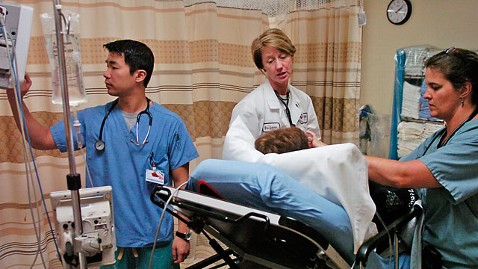Sequester at Home: Medicare Cuts Mean Tough Choices for Colo. Hospitals

From left, Andrew lieberman, EMT, Dr. Diahn Lohman, and Laura Navarre, RN, work on a woman who was brought into Rose Medical Center's ER with breathing problems. RJ Sangosti/The Denver Post/Getty Images
As federal employees are contemplating smaller paychecks this week, administrators at rural hospitals are struggling just to keep their balance sheets in the black, thanks to the sequester.
In 2011, Medicare payments to Colorado hospitals were $253 million less than in 2009, according to the Colorado Hospital Association. Now those same institutions are facing another 2 percent decrease in reimbursement for Medicare services. That one-two punch could knock some hospitals out of the ring, according to Russ Johnson, CEO of San Luis Valley Regional Medical Center in Alamosa, Colo.
"For those folks that don't have a balance sheet that's healthy, and they're already on the edge, it's a very significant jeopardy," Johnson told ABC News. "I would expect not just with sequestration but with what's happening in our country - maybe out of necessity to reduce costs - we're going to see some hospitals that have been struggling finally not be able to continue."
The New York Times reported on hospitals' fear of the sequester - the automatic government spending cuts that kicked in March 1 - in December, before Congress voted to push it off by a couple months. The $85 billion package of spending cuts officially went into effect last week, and now Steven Summer, president of the Colorado Hospital Association, said cuts were about to hit especially hard in a state facing a drought and other economic challenges. For Coloradans, it will mean doctors and patients will have to make sacrifices, according to Summer.
"It could potentially have patient waits increase," Summer said. "If it's a staffing question then certainly staffing has an impact on patient care."
Florida, a state with a higher-than-average Medicare-eligible population, is facing similar fears this spring.
READ MORE: Sequester at Home: Florida Could Lose Blue Angels Shows, Medicare Payments
Actual Medicare benefits are protected from sequester cuts, but that does not mean patients won't see a change in care. With a 2 percent reduction in payment for Medicare services, hospitals will have to look elsewhere to make up that lost revenue.
For Johnson's hospital in rural Colorado, Medicare makes up 37 percent of its business.
Cutting revenue will mean less funding available to support the clinics for patients with diabetes or those on blood thinners that the hospital provides, according to Johnson.
"All of those things right now in our current model aren't reimbursed, and so those are the things when you do get reimbursement cuts that you necessarily have to think through and ponder how do you continue to do that," Johnson told ABC News Wednesday. "This isn't the death knell for us. Two-percent cut to Medicare in this year isn't going to jeopardize our organization, but it's very likely to compromise some service and if this kind of a cut continues, then we will be changing kind of who we are as a hospital and what we're able to do in our community."
Nestled in a rural alpine valley surrounded by mountains and just over the border from New Mexico, Johnson's hospital has the only ICU, the only obstetric service and the only trauma surgeon for six counties, he said.
"It's not like people shop around and go to another location because there's only one that's able to serve this community," Johnson said.
Hospitals have to be very careful when implementing furloughs - the mandatory unpaid leave most government agencies are forcing on employees to offset budget cuts. While fewer inspectors on duty at U.S. Customs might mean longer lines at airports, the same situation in a hospital can mean life or death.
Johnson said many rural hospitals are already operating with minimal staff.
A 2004 report from the Institute of Medicine found uneven staffing was "posing risks to patient safety."
"The committee finds strong evidence that nurse staffing levels, the knowledge and skill levels of nursing staff, and the extent to which workers collaborate in sharing their knowledge and skills affect patient outcomes and safety," the report, called " Keeping Patients Safe: Transforming the Work Environment of Nurses," said.
A study published in the New England Journal of Medicine found short-staffing nurses in hospitals put patients in danger, with patients at understaffed hospitals more likely to die after their care there.
Beyond patient health, Medicare cuts mean Colorado hospitals have to re-evaluate how they adopt President Obama's health care law, the Affordable Care Act.
READ MORE: Sequester: What Will Happen, What Won't Happen and What We Don't Know
A timeline from the Kaiser Family Foundation shows implementing the Affordable Care Act will take eight years, with much of the work occurring in the next two years.
"This postpones the kinds of decisions we need to make to transform the health care system," Summer told ABC News. "All those decisions related to [the ACA] have to wait until we have the stability in the system, so we can implement some of those changes in the payment system."
Sen. Mark Udall, D-Colo., introduced legislation to change the path of sequestration on Monday, but the bill does not specifically address Medicare payments.
The bottom line for Johnson is that there are ways to bring down health care costs responsibly, but sequestration isn't one of them.
"I am fully supportive of helping our country be fiscally responsible, and that means reducing health care costs," Johnson said. "But this way of doing it where we just kind of take a broad swath out of Medicare is really ill-conceived, when there's so many good ideas and so many proven options where we can remove costs from our system and from health care that don't harm the patient, that don't compromise our clinicians or our hospitals."